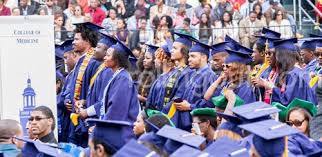 Howard currently offers 28 Ph.D. degree programs and awarded its first doctoral degree to two chemistry students in 1958.
Howard currently offers 28 Ph.D. degree programs and awarded its first doctoral degree to two chemistry students in 1958.Howard University has maintained it lead as the top producer of on-campus doctoral degrees awarded by Historically Black Colleges and Universities.
The HBCU announced this week that it plans to graduate 105 Ph.D.s from a variety of academic departments—the largest number of doctoral degrees to be conferred in the school’s 147-year history—at Saturday’s commencement ceremony where the keynote speaker is Sean “P. Diddy” Combs.
“Since its founding in 1867, Howard has served as a national leader in educating populations that are traditionally underrepresented in higher education,” says the university’s interim president, Dr. Wayne A.I. Frederick, who earned an M.D. and an MBA from the university. “Without Howard’s contribution to the production of doctoral recipients among African-Americans and other under-represented populations, our nation’s goals of significantly enhanced diversity in higher education and the research community would be much more difficult to achieve.”
The hard work has paid off for Bethtrice Thompson, who will march down the aisle and receive a Ph.D. in biology. The Hazlehurst, Miss., native whose dissertation focused on using STEM cells to fight Brittle Bone disease, came to Howard because of its national reputation for research and her desire to secure a coveted position at the National Institute of Health.
She will continue in a temporary position at NIH but has also applied for several long-term university post-doctoral fellowships with an eye toward ultimately securing a tenure-track teaching position.
“It hasn’t been easy,” she says of her time in Howard’s doctoral program. “I had good days and bad days, but as time progressed, I met so many wonderful people who encouraged and pushed me and reminded me of why I wanted a Ph.D. in the first place.”
Katara M. Watkins, a Washington, D.C., native, spent seven years researching and writing about the impact of abuse and neglect on Black children detained in the criminal justice system. On Saturday, she will earn a Ph.D. in counseling psychology and has already lined up a job working in the Child Guidance Clinic at the D.C. Superior Court.
The department’s focus, she says, on the use of empirical, qualitative data has helped to hone her research skills.
“I’ve seen positive shifts since the beginning of the program,” says Watkins. “The research component is very strong, and the clinical piece is really emphasized.”
Howard currently offers 28 Ph.D. degree programs and awarded its first doctoral degree to two chemistry students in 1958.
Still, other universities have not fared as well in producing as many Black Ph.D.s, says Maurice Green, executive director of the Black Doctoral Network (BDN), a multidisciplinary clearinghouse for Black and Latino scholars and professionals in the Social Sciences, STEM, and Humanities.
“One might posit that the sheer number of acceptances of Black doctoral students would be in itself sufficient to explain the graduation success enjoyed by a Historically Black College or University like Howard,” says Green, who is planning the second annual BDN conference in Philadelphia in October. “However, a fact to which any member of the Black Doctoral Network could attest to is that acceptance does not equal successful matriculation.
“The academic environment would also need to be conducive to and supportive of the specific challenges faced by Black scholars in the academy. Unfortunately, that is not a major concern addressed by many doctoral programs.”
Jamal Watson can be reached at [email protected]. You can also follow him on twitter @jamalericwatson















